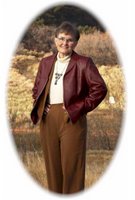Ask the Authors: Friday
 What are your most frequently used vehicles for research? (Your public library. The internet. Your own library, including any encyclopedias, atlases, other reference books.)
What are your most frequently used vehicles for research? (Your public library. The internet. Your own library, including any encyclopedias, atlases, other reference books.) I've accumulated a personal library that I'm grateful for. Because most of my stories are based on the lives of real people, I do a lot of "hands on" research, visiting the sites of my stories, spending time in genealogoical research libraries, State Archives, County libraries and historical societies. I interview descendants as I find them. History books about the time period or the settlement or the territories are important for me. I have a few of Bancroft's histories published in the late 1890s considered THE research material for the time. The internet was helpful for Hudson's Bay Company records (they keep them back to the 1600s!) so I didn't have to go to Winnepeg, a far distance from my home. I also use the internet for calendars, for researching details (what is a chateleine and how did a woman use it?). I have Lamar's Encyclopedia of the American West and Oregon Geographic Names as two fat books that give me lots of good information. And then I read tons of non-fiction books on medicine, law, everyday life, etc. so I can place my readers into the time period, hopefully without them ever having to say "now, would that have happened like that then?" -Jane Kirkpatrick
My own personal library, including old diaries, articles, and journals, and the internet (with caution). I still enjoy visiting my public library, though, even if it's not a "have-to" case for research. -BJ Hoff
I use the Internet and people. I love using people. I use them as much as I can. They are invaluable resources and always give me more information than I thought I would get, which usually ends up helping me expand my story in a way I didn't expect. -Rene Gutteridge
My husband. Since we write together, and he's the researcher, all I have to do is email him a question, and he looks it up online. Or he already knows the answer. Or he asks a medical colleague. -Hannah Alexander
Internet--almost exclusively. -Lori Copeland
The Internet has become my first stop for researching; http://www.refdesk.com/ is my meat and potatoes. But there is no substitute for a library; personal, public, and university. —Jack Cavanaugh
I have a 1950's set of the Encyclopedia Britannica (my grandfather used to sell 'em) and so many of the entries are still valid and much deeper than the froth delivered up by today's editions (in part because of the dumbing down of education, but that's for another post). When I was doing my historical series for Bethany House, it was priceless for finding gems, such as the history of telephones, movies, etc. -James Scott Bell
Though I don’t often trust the World Wide Web as a source of factual information, I usually start out on the Internet. What I find there might lead me to a book (which I order online) or the contact info for an individual or organization who has the information I need. I’ve also found newspaper and magazine articles to hold good information, but again, I always want to verify that info elsewhere. It boggles my mind to think that virtually all my research for my first novel 13 years ago was done at my public library. These days, I might go to the library once every couple of months. Come to think of it, I actually kind of miss my library! –Deborah Raney
I use the Internet, books, personal experience, and people. Because my books are contemporary, I can talk with people involved in the things I'm including in my book. For example, in preparation for writing Kaleidoscope Eyes, in which the protagonist is part of a K-9 search and rescue team, I'd been a part of search and rescue for a number of years. However, I knew I needed to research the K-9 aspect of SAR. So I was able to go with the K-9 unit when they did training, to video tape the handlers and dogs and ask whatever questions I wanted. Plus I had a member of our area K-9 SAR group review the manuscript for accuracy. So I knew that aspect of the book would ring with authenticity. -Karen Ball
Vehicles? I prefer Porsche, please. Or a 'vette or Lexus will do. If none of these is available, I'll take the Internet. -Brandilyn Collins
Books, books, books on whatever topic I’m writing, especially the books that are in my Logos reference program (they’re word-searchable). The Internet for quick facts, maps, and names. And my world atlas. –Angela Hunt
The books I mentioned yesterday, plus countless biblical commentaries, dictionaries, resource books, and Bibles. I do use Internet research, but with great care. My own personal library includes 825 reference books on Scotland, including several antiquarian books from the late eighteenth century. I've also done extensive traveling (9 trips to Scotland, 2 trips each to England, France, Germany), conducting interviews as I go, making copious notes about everything I see, and, of course, taking tons of photos! -Liz Curtis Higgs
Definitely the internet. I rarely use anything else. -lisa samson
Used to be my own library, but more and more I’ve been using the Internet. If I want to do any research in depth, though, I usually buy a book or two. –Karen Hancock
I rarely visit libraries unless they are specialized (for instance, the US Navy Historical library on the yard—the campus—of the US Naval Academy... I’ve used that one). I use the ‘Net, but bear in mind that easily 75% of the sites out there contain info that is misleading or just plain wrong. Sites I trust most belong to government agencies, academic organizations and the like. I also find online retailers to be good sources of info on current goods (like guns). I do primary-research interviews, but treat sources with the same grain of salt that I extend to the Internet; one good touchstone is to begin by asking questions that I already know the answer to. Just because someone is a cop, or owns a gun shop, or works for an auto company, or was in the service doesn’t necessarily mean that he or she is a reliable source for facts. When I need books, I usually buy them rather than borrowing them, as I love books and that way I can highlight and put in my own marginalia. Ditto regarding maps. -Tom Morrisey



















